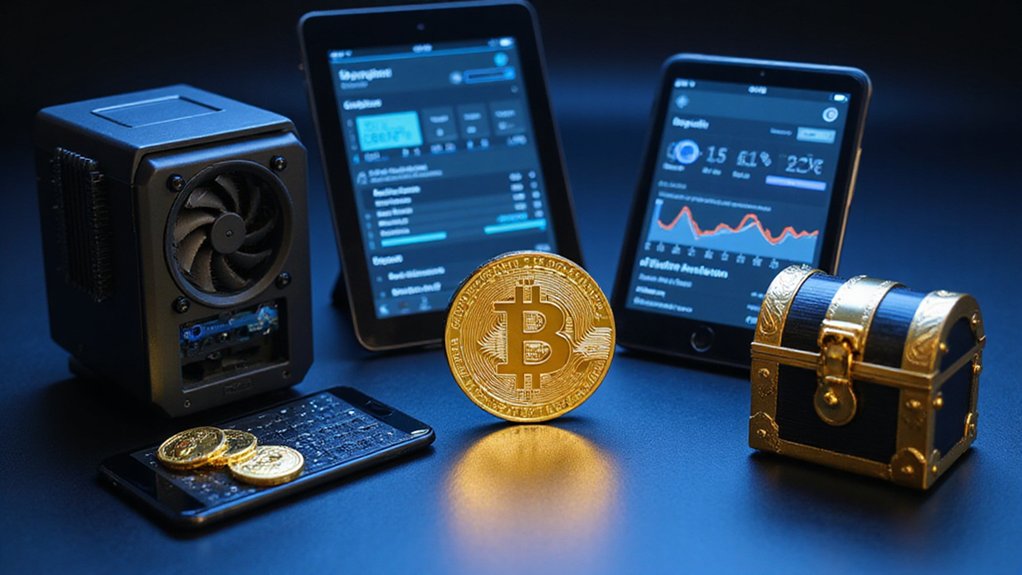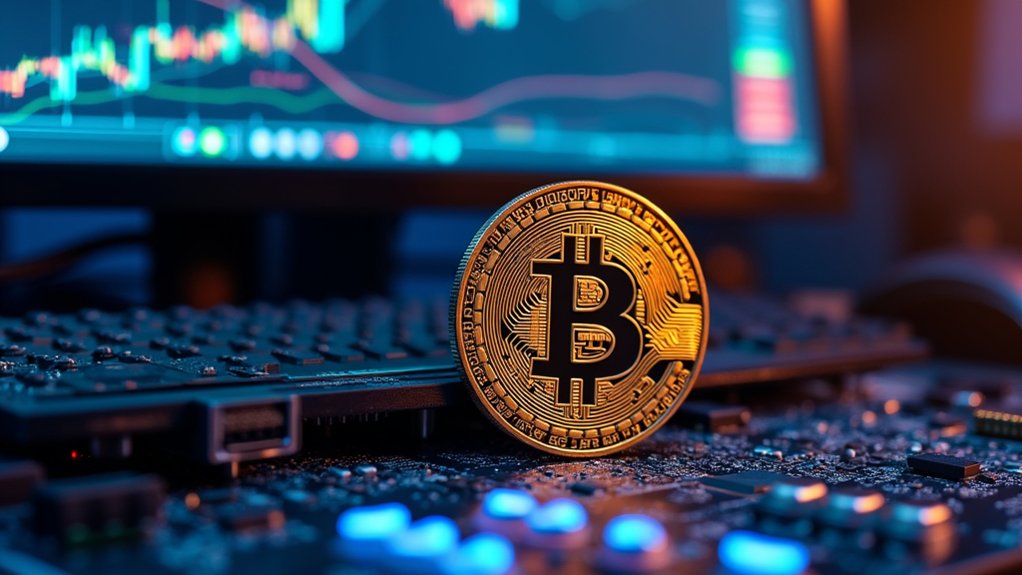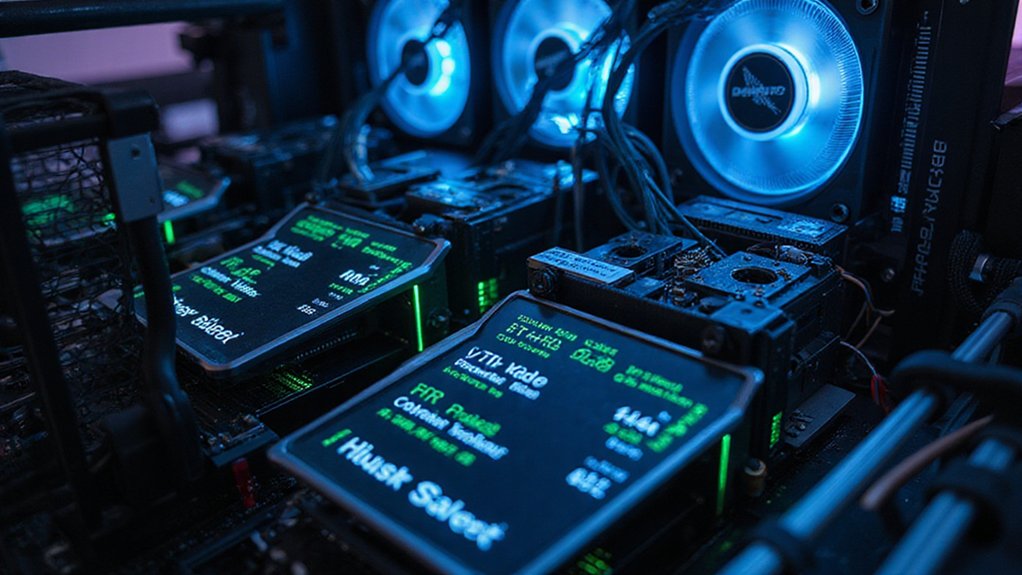Five legitimate methods for acquiring Bitcoin exist beyond simply purchasing it: mining with specialized ASIC hardware (electricity costs notwithstanding), staking in proof-of-stake networks (though Bitcoin itself doesn’t support this), lending through platforms (despite notable counterparty risks), engaging in affiliate marketing through exchange referral programs, and exploring alternative acquisition methods like cloud mining or learn-and-earn initiatives. Each approach carries its own risk-reward profile—a critical consideration for anyone seeking to expand their crypto holdings without traditional market speculation.

While fortunes have been made (and lost) in the volatile world of cryptocurrency, acquiring Bitcoin without purchasing it outright remains an attractive proposition for many digital asset enthusiasts.
The methods available extend beyond simply hoping for price appreciation, though one should approach each with appropriate skepticism regarding risk-to-reward ratios.
While opportunity exists beyond market speculation, each pathway demands careful evaluation of inherent risks against potential benefits.
Mining—once accessible via consumer hardware—now requires specialized ASIC equipment and considerable electricity resources.
Participants typically join mining pools, combining computational power for more consistent (if smaller) rewards while handling fluctuating difficulty adjustments.
Those in regions with inexpensive power maintain distinct advantages, as energy costs constitute the primary overhead in this increasingly industrialized pursuit.
Staking represents a less resource-intensive alternative, though Bitcoin itself doesn’t support this mechanism¹.
Instead, proof-of-stake networks like Ethereum allow participants to validate transactions by locking tokens, earning rewards proportional to their commitment.
Cold staking solutions even permit this while maintaining offline security protocols—an elegant compromise between accessibility and prudence.
For the financially adventurous, crypto lending platforms enable Bitcoin holders to generate passive income by extending loans to borrowers.
The counterparty risk inherent in these arrangements shouldn’t be underestimated, however, as several high-profile platform collapses have demonstrated with painful clarity.
Those with entrepreneurial inclinations might consider affiliate marketing through exchange referral programs.
Major platforms compensate users for successful referrals with commission structures ranging from flat fees to percentage-based rewards—some even offering multi-tiered benefits extending to referred users’ subsequent activities.
Cloud mining services present another option for those seeking Bitcoin without hardware investment, though these typically deliver lower profitability due to service fees and contract limitations.
Finally, the least demanding approach involves learn-and-earn initiatives and legitimate airdrops.
Platforms like Coinbase periodically reward users who complete educational modules with small cryptocurrency allocations, while established projects occasionally distribute tokens to qualifying wallet addresses. Tracking airdrops through airdrop aggregators and actively participating in blockchain communities can significantly increase your chances of qualifying for free token distributions.
The latter requires particular vigilance regarding authenticity, as fraudulent schemes abound in this space.
¹Bitcoin’s proof-of-work consensus mechanism intentionally precludes staking functionality.
Frequently Asked Questions
Are Bitcoin Winnings Taxable Income?
Yes, Bitcoin winnings constitute taxable income in the eyes of the IRS, with taxpayers obligated to report the fair market value of their crypto windfall at the time of receipt.
Whether one’s digital fortune materializes through gambling, competitions, or other means (the source being largely irrelevant to its taxability), Uncle Sam demands his due—a reality that, while perhaps inconvenient to crypto enthusiasts, remains as inevitable as blockchain confirmations during network congestion.
Can I Win Bitcoins Without Any Initial Investment?
Acquiring Bitcoin without initial capital outlay is indeed possible through various legitimate channels.
One can pursue referral programs, complete microtasks on platforms offering crypto compensation, participate in Bitcoin faucets distributing Satoshi fragments, or engage with gaming platforms featuring cryptocurrency rewards.
Additionally, freelancing for Bitcoin payment, participating in airdrops, or contributing to bounty programs presents viable opportunities for the investment-averse individual seeking entry into the cryptocurrency ecosystem—though returns are, predictably, commensurate with effort rather than spectacular.
What Security Risks Should I Consider When Trying to Win Bitcoin?
Legitimate bitcoin acquisition comes with its own security minefield.
Crypto-mining malware can siphon computing resources via phishing, infected applications, or DNS hijacking—leaving one’s hardware overheating and electric bills soaring.
Beyond resource theft, these vectors often introduce additional threats: SQL injections, DDoS attacks, and command exploits that compromise entire systems.
When pursuing digital assets, one must implement robust protections (WAFs, DNS filtering, vulnerability testing) or risk becoming an unwitting cryptocurrency miner for someone else’s wallet.
How Quickly Can I Withdraw Bitcoin Winnings?
Withdrawal speeds for Bitcoin winnings vary greatly—from minutes to days—contingent upon multiple variables.
Network congestion (that perennial bottleneck) and transaction fees dictate blockchain confirmation times, while exchange-specific policies impose their own temporal constraints.
The prudent winner should anticipate delays during high network volume periods and consider paying premium fees for expedited processing.
Verification requirements at exchanges, particularly for substantial withdrawals, may trigger additional security protocols that—while inconvenient—protect one’s hard-won digital assets.
Are Bitcoin Giveaways and Contests Regulated by Any Authorities?
Bitcoin giveaways and contests operate within a complex regulatory framework involving multiple authorities.
Federal oversight comes via the UIGEA and state-specific gaming laws, with contests requiring skill-based mechanisms to avoid gambling classification.
The SEC and CFTC may assert jurisdiction over crypto promotions resembling securities or derivatives offerings.
Compliance necessitates traversing a labyrinth of money transmitter licenses, KYC/AML requirements, and state-specific promotional rules—an inconvenient reality for what many erroneously assume is an unregulated space.









